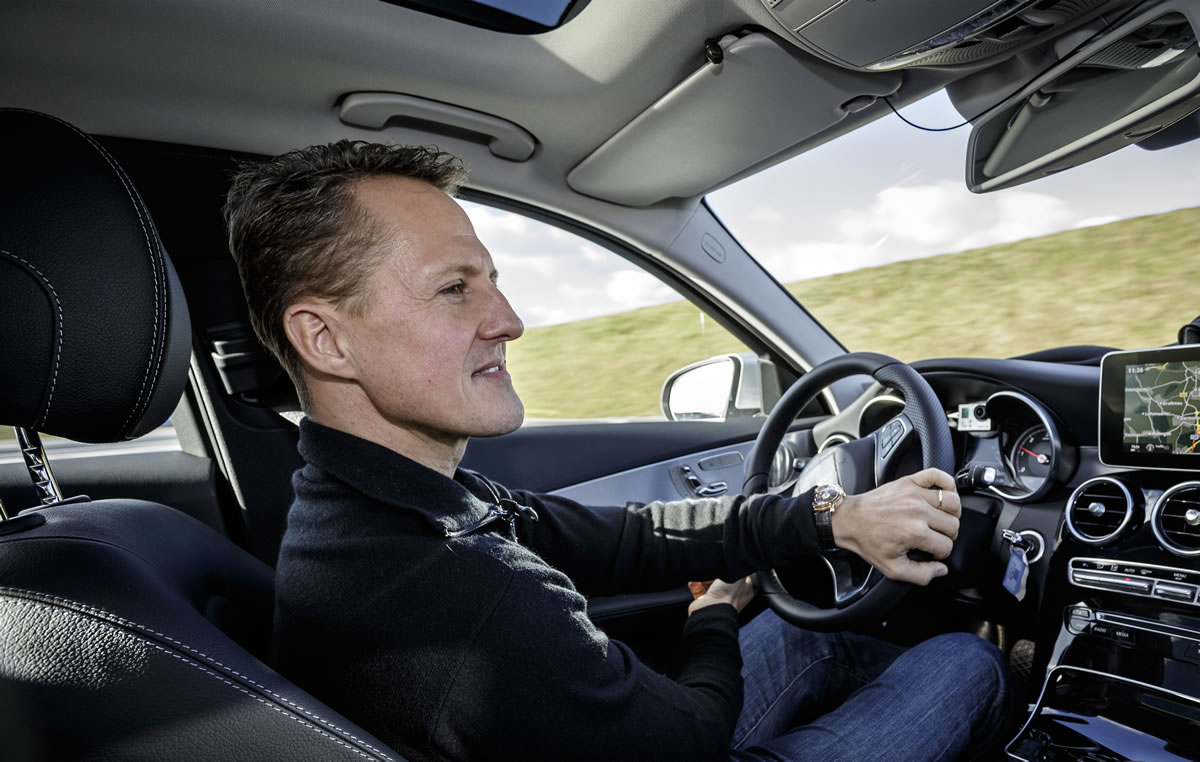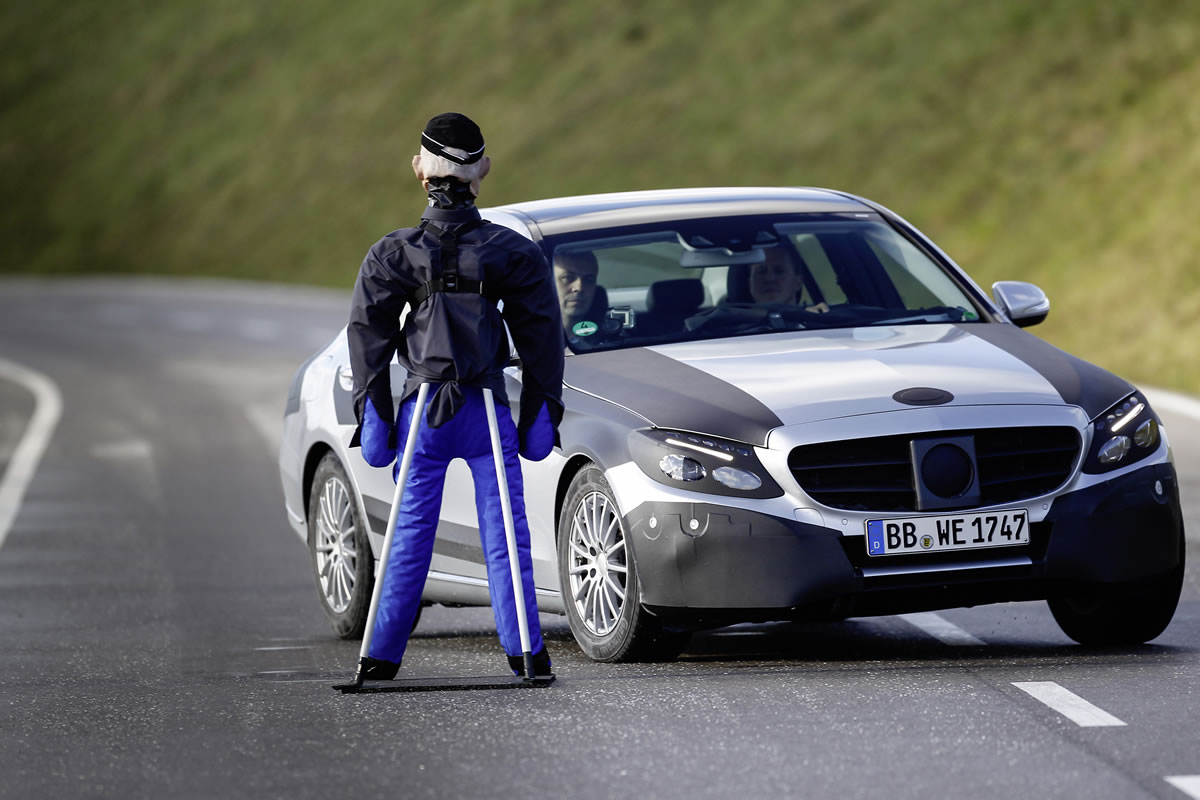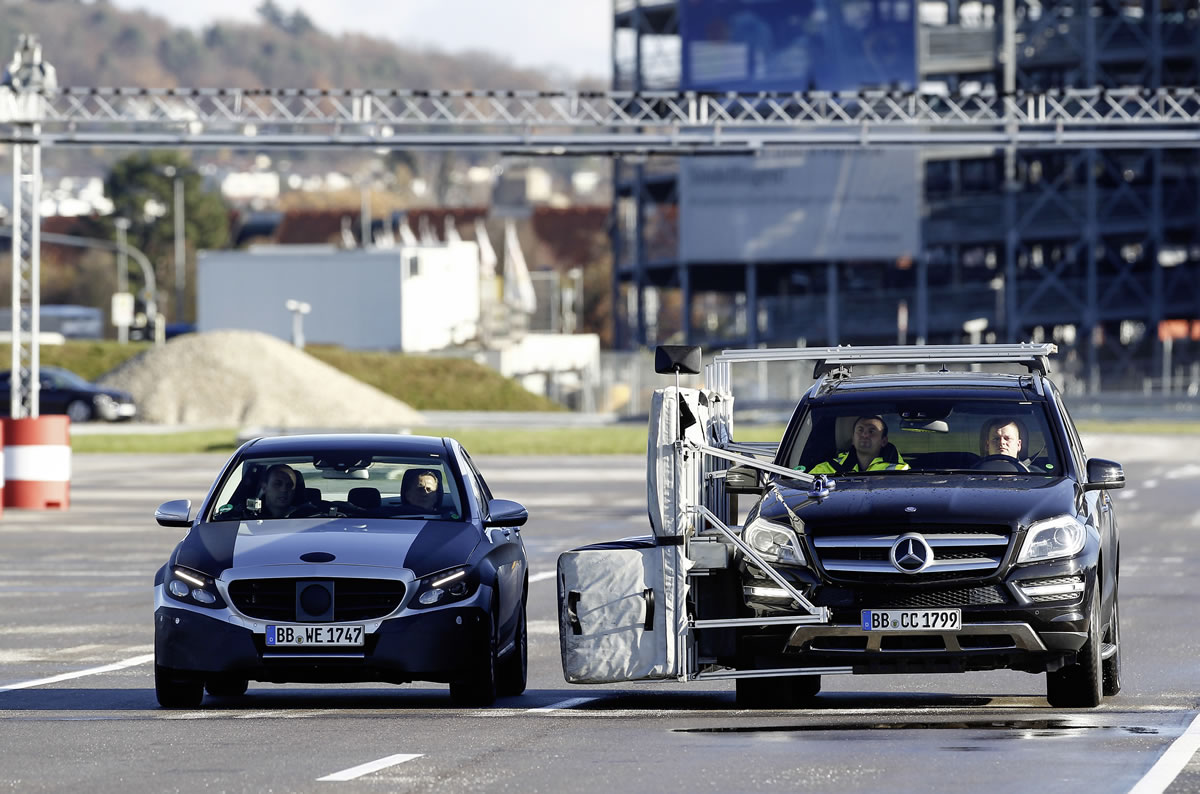Last week, Formula 1 legend and now brand ambassador for Mercedes-Benz, Michael Schumacher tested the safety systems of the new C-Class at the Mercedes Technology Center in Sindelfingen dubbed SimCity. SimCity is a secluded test site where new assistance systems can be tested, and smartly so – can you imagine the spy videos that would pop up on teh web if Schumacher crashed a car do to a failed system. Think back to the reporter that crashed the S-Class while testing the brake assist, the web blew up with failed crash photos.

Michael Schumacher tests the new C-Class
“Nobody is able to give 100% concentration all the time over a longer period to cope with the car and traffic situation. Sometimes just a moment of inattention is enough. And that is precisely why I support intelligent assistance systems for passenger cars,” Schumacher says about Intelligent Drive. “Assistance systems are never distracted and never get tired. Assistance systems have no delay for reaction time. They can save lives.”
“With Mercedes-Benz Intelligent Drive we have ushered in a new era of active safety, and are once again confirming our position as a safety pioneer,” says Jochen Hermann, chief engineer responsible for assistance systems and active safety at Mercedes-Benz. “Preventing accidents and minimising their consequences: this is the holistic approach taken by the Mercedes-Benz safety philosophy, which the company refers to collectively as ‘Real Life Safety’.”
Mercedes-Benz is consistently pursuing this strategy with the C-Class, which has numerous new assistance systems and significantly extended functions. Comfort and safety are enhanced at the same time. The new functions use the same sensor system – a new stereo camera and multi-stage radar sensors.

Michael Schumacher tests the new C-Class
The central focus of Schumacher’s test drives with the new Mercedes-Benz C-Class was on assistance systems such as:
COLLISION PREVENTION ASSIST PLUS. At speeds of 30 km/h and above, it issues a visual warning if the gap between the driver’s vehicle and the vehicle ahead is too small, with an additional acoustic warning at 7 km/h and above if there is a danger of collision, and provides an adaptive braking assistance function which, depending on the situation, can boost braking if the driver is not braking hard enough. If the driver does not react, now, for the first time in a series-production system, a collision with slower or stopping vehicles ahead when driving at speeds of up to 200 km/h can be prevented or at least minimised by automatic, autonomous partial braking. The system also brakes in response to stationary vehicles at a speed of up to 50 km/h, and is able to prevent rear-end collisions at speeds of up to 40 km/h.
DISTRONIC PLUS with Steering Assist and Stop&Go Pilot helps the driver to maintain a suitable distance, even in stop-and-go traffic. The steering assistance feature is new and helps the driver with lateral control of the vehicle, even on gentle bends, and offers a traffic jam vehicle following function.
The PRE-SAFE® Brake provides autonomous braking in the absence of a driver reaction. In typical urban driving scenarios, it can prevent collisions with pedestrians or stationary vehicles at speeds of up to approx. 50 km/h; or, at speeds of up to approx. 70 km/h reduce the impact of such collisions.
Brake Assist PLUS with Cross-Traffic Assist can, depending on the situation, boost the braking strength applied by the driver, if necessary up to full brake application and, for the first time, can also react to crossing traffic and pedestrians.
Active Blind Spot Assist issues a visual and – if the indicator is activated – an acoustic warning of the presence of a vehicle in the blind spot area; and can prevent a potential side-on collision by applying the brakes unilaterally at the last moment.
Active Lane Keeping Assist warns against unintentional drifting across a lane through vibrations of the steering wheel; and if the vehicle actually crosses a lane marking, corrects the vehicle’s position through unilateral brake application. It also applies the brakes unilaterally if the vehicle drifts across a lane marking and the neighbouring lane has, for example, oncoming traffic, overtaking or overtaken vehicles in it.
For Jochen Hermann, the tests with Michael Schumacher are a useful supplement to the millions of test kilometres in the simulator, on the roads and on test tracks around the world. “It is enormously enjoyable to work with Michael Schumacher. He is not only sensationally good at manoeuvring cars, he has an extraordinary understanding of technology and driving physics combined with the ability to identify potential solutions precisely and rapidly. I think this cooperation will bear a great deal of fruit in the future. Our shared aim is more safety for all road users.”
“What I personally find very good is this: it is not necessary to buy an S-Class to obtain the latest systems; instead Mercedes-Benz is rapidly making this technology accessible to many car drivers now – in the new C-Class, for example; or even, in the case of COLLISION PREVENTION ASSIST and ATTENTION ASSIST, as standard equipment right from the A-Class upwards. This is an approach I can only applaud – safety must be made available to everyone,” Schumacher said after concluding the test drives.





